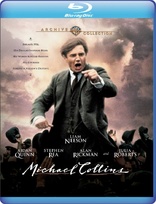Michael Collins Blu-ray Movie
HomeMichael Collins Blu-ray Movie 
Warner Archive CollectionWarner Bros. | 1996 | 132 min | Rated R | Mar 22, 2016
Movie rating
7.1 | / 10 |
Blu-ray rating
| Users | 4.0 | |
| Reviewer | 4.0 | |
| Overall | 4.0 |
Overview
Michael Collins (1996)
A chronicle of the rise and fall of Michael Collins, one of the most important and controversial figures in the Irish fight for independence. Collins's Irish Volunteers used a combination of terrorist violence and guerilla warfare to combat the British, but Collins could not contain the violence he had unleashed.
Starring: Liam Neeson, Julia Roberts, Alan Rickman, Ian Hart, Aidan QuinnDirector: Neil Jordan
| History | Uncertain |
| War | Uncertain |
| Biography | Uncertain |
| Drama | Uncertain |
Specifications
Video
Video codec: MPEG-4 AVC
Video resolution: 1080p
Aspect ratio: 1.78:1
Original aspect ratio: 1.85:1
Audio
English: DTS-HD Master Audio 5.1 (48kHz, 24-bit)
German: Dolby Digital 2.0
Spanish: Dolby Digital 2.0
Spanish: Dolby Digital 2.0
Japanese: Dolby Digital 5.1
Spanish=Latin & Castillian; Japanese is hidden
Subtitles
English SDH, French, German SDH, Japanese, Spanish, Czech, Korean, Mandarin (Traditional), Polish, Thai, Turkish
Discs
50GB Blu-ray Disc
Single disc (1 BD)
Playback
Region A (B, C untested)
Review
Rating summary
| Movie | 4.0 | |
| Video | 4.0 | |
| Audio | 3.5 | |
| Extras | 4.0 | |
| Overall | 4.0 |
Michael Collins Blu-ray Movie Review
A History of Violence
Reviewed by Michael Reuben March 21, 2016After the international success of Interview with the Vampire in 1994, Warner Brothers offered
director Neil Jordan his choice of projects. Jordan seized the opportunity to retrieve his script for
Michael Collins from the studio vault and get a meaningful (if not lavish) budget for a project
he'd been contemplating for more than a decade. Jordan's account of the short, eventful life of
the charismatic Collins—Irish country lad turned politician, statesman and military leader—has
only gained in stature since it was first released in 1996 to critical acclaim and (in Ireland)
record-setting box office. As complex and multi-layered as its title character, Michael Collins is
part historical epic, part intimate character drama and part meditation on the use and perils of
violence for political ends. It is also, quite consciously on Jordan's part, a gangster picture.
This year marks both the twentieth anniversary of the film and the 100th anniversary of the so-called Easter Rebellion that is generally
considered the beginning of the end for British rule in
Ireland (although the British departure would last more than eighty years). For the occasion,
Warner has remastered Michael Collins on Blu-ray with the participation of director Jordan, who
has supplied a new commentary (among other extras). The disc is being released overseas by
Warner's foreign affiliates and, in the U.S., by the Warner Archive Collection.
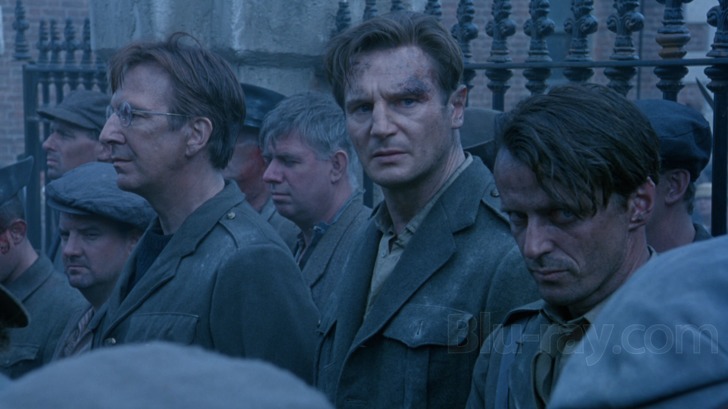
We first meet Michael Collins (Liam Neeson) as a soldier in the six-day Easter Rebellion of 1916, when a group of Irish rebels demanding independence seize control of key government buildings in Dublin. After surrender of the Irish forces, the British summarily execute the ringleaders in a show of toughness. The lesson is not lost on the young rebel, who emerges from prison two years later determined to find a more effective way to fight Ireland's occupiers from the neighboring isle. Working with his best friend, Harry Boland (Aidan Quinn), Collins develops the style of urban guerilla warfare that will become all too familiar for the rest of the century, militarizing the entire populace so that the British cannot distinguish between soldier and citizen.
Collins and his forces focus their attack on members of the Royal Irish Constabulary's G division (known as "G men"), who serve as the eyes and ears of the British, maintaining detailed files on suspected rebels. A surprise ally appears in the person of Ned Broy (Stephen Rea), a poker-faced G man assigned to shadow Collins who becomes the rebel leader's inside source. In a famous incident taken from history, Broy sneaks Collins into police headquarters, where he spends the night reviewing the files on himself and his compatriots and decides to adopt the same tactics against the Constabulary. Within a short time, Collins has assembled a list of names and addresses, and G men are shot down in the street in a style that anticipates the Chicago of Al Capone (not to mention the New York of Michael Corleone).
The first half of Michael Collins is dominated by the escalating battle against the forces of occupation, with the British dispatching wave after wave of tough-talking enforcers, all of whom are targeted and eliminated by Collins' men. The most snobbish and cold-blooded is Soames, the leader of MI5's "Cairo gang", who is played by Charles Dance with a sneer befitting the Sheriff of Nottingham. In a demonstration of the efficacy of Collins' techniques, Soames is undone by the Irish chambermaid who supplies clean linen at the hotel where he stays. But the British inflict heavy casualties in return. One of the most famous examples is "Bloody Sunday" of November 12, 1920, when a combined force of Royal Irish Constabulary and British soldiers fire into the crowd gathered for a football match in Croke Park, randomly killing players and spectators. (Provoking controversy, Jordan has changed the nature of the weaponry for cinematic impact, but the killings actually happened.)
In the film's second half, Collins' role switches from commander to statesman, as a truce is declared and the former soldier reluctantly takes the lead in negotiating terms for an independent Ireland. It is here that the film's villain emerges in the person of Eamon de Valera (known as "Dev"), a wily and contradictory figure played by the late Alan Rickman with consummate inscrutability. Having refused to participate in the negotiations himself, de Valera dissents from the treaty that Collins achieves; then he secedes from the Irish Parliament with his followers after the treaty is approved. As the Irish revolution descends into civil war, Collins find himself battling the very forces he trained to fight the British. Like the tragic heroes of classical drama, the same strengths that made Collins rise now lead to his downfall, as the forces of violent resistance he mustered against the British frustrate any prospect of a peaceful resolution. The text at the film's conclusion argues that Collins died in an effort to "remove the gun from Irish politics", but his failure is evident in both his own death and the many decades of violent conflict that would follow.
Woven throughout Michael Collins is the story of the romantic rivalry between best friends Collins and Harry Boland for the affection of Kitty Kiernan, whom they meet when Collins is hiding on a farm recovering from a beating received at a rally. (Kitty is played by Julia Roberts in what might reasonably be mistaken for "star" casting, but Jordan is adamant that it was Roberts who lobbied him for the role.) While both Kitty and Collins try to resist their growing attraction for Harry's sake, their connection is powerful, and Collins' ultimate split with Harry, who supported de Valera, is made all the more painful by their private falling-out. We know from the outset that the relationship is doomed, because the film opens with Kitty being consoled by Collins' lieutenant, Joe O'Reilly (Ian Hart), after Collins has been killed in an ambush. Debate continues over de Valera's involvement in the assassination of his chief rival, and Jordan's film hints at the possibility without taking a stance.
Liam Neeson gives Collins a tragic grandeur, capturing with equal force the ruthless commitment with which he could order multiple murders of his countrymen and the deep well of panic and sorrow that overcomes him as he realizes that he is powerless to contain the violence he unleashed. In a sequence that is typical of the film's dramatic nuance, Jordan cuts back and forth between the cold-blood executions of the Cairo Gang and Collins in a hotel room with Kitty awaiting word of the outcome. Collins asks Kitty not to fall in love with him and she promises not to—and they're both lying.
Michael Collins Blu-ray Movie, Video Quality 
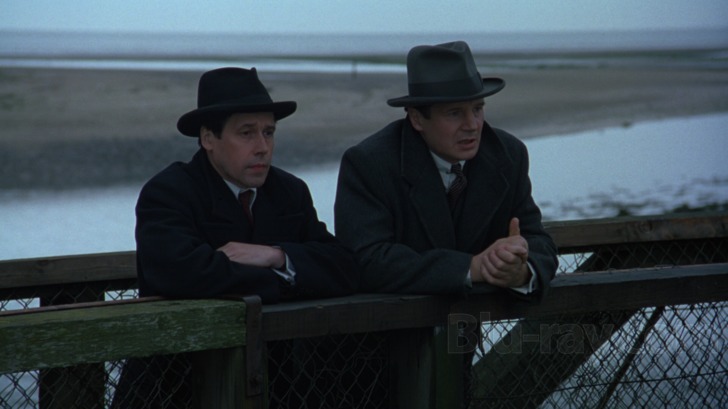
Michael Collins was shot on film by two-time Oscar-winning cinematographer Chris Menges
(The Killing Fields, The Mission), who was nominated again for his work on this
film. In Neil
Jordan's new Blu-ray commentary, he discusses Menges' approach at length, noting his
preference for natural light and praising the DP's talent for lighting practical locations in a
manner that allowed the actors to move freely and the director to point the camera in any
direction. The negative was processed in post-production to desaturate the colors, and by design
the frame rarely contains any shade that is bright or rich. A notable exception (deliberate, as
Jordan confirms) is the bouquet of red roses in the hotel room where Collins waits with Kitty for
assassins to report that they have accomplished their mission.
For its Blu-ray debut, Warner has newly scanned an interpositive at 2K, which was then color-corrected using an answer print as a reference.
Although Neil Jordan did not supervise the
transfer, I have been advised by a reliable source that he has viewed the final product and
vouched for its accuracy. The Warner Archive Collection's 1080p, AVC-encoded Blu-ray sports
a detailed and film-like image that does equal justice to the film's massive crowd scenes (staged
with thousands of volunteer extras from the Dublin populace, and no CGI) and its many stylized
shots in which both detail and color are deliberately reduced, e.g., the frequent use of silhouetted
figures against a contrasting background of brightness, rain or smoke —an intentional call-back
to gangster movies and film noir. Blacks are solid and dark, and Menges often composes a frame
with a deliberate contrast between warm and cool colors to create depth. The desaturated palette
contributes to the sense of Dublin as a worn and shabby locale (another deliberate choice on
Jordan's part), and it also contrasts sharply with the greenery of the occasional park or country
location, including Collins' home turf of County Cork, to which he returns in the film's final act.
WAC has mastered the 132-minute film with an average bitrate of 30.99 Mbps, which is below
its usual target of 35 Mbps but has still allowed plenty of room for the compressionist to achieve
an image free of artifacts.
Michael Collins Blu-ray Movie, Audio Quality 
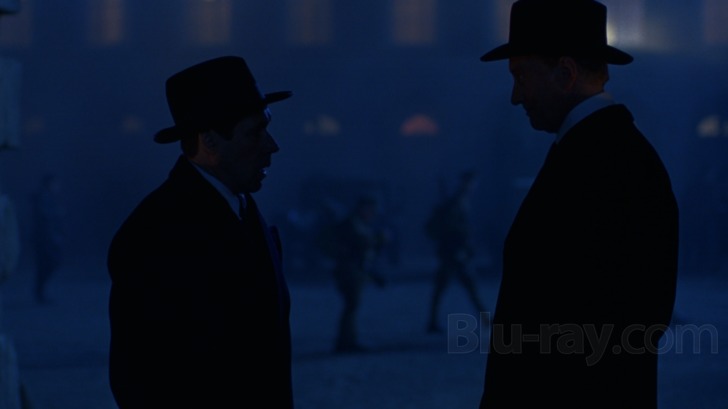
Scenes of urban warfare are the standout in Michael Collins' 5.1 sound mix, encoded on Blu-ray
in lossless DTS-HD MA. Jordan has repeatedly expressed his appreciation (and astonishment) at
the extent of cooperation he received from local authorities, which allowed him to "blow up"
Dublin several times. The film's opening, at the conclusion of the Easter Rebellion, plunges the
viewer into a war zone, with the thunder of the British artillery drowning out the gunfire of the
fading Irish rebels. Sound effects of similar impact accompany the Irish Civil War later in the
film, as well as numerous scenes of confrontation with the Royal Irish Constabulary and the
British units known as "black and tans". In scenes of crowded debate, such as Collins addressing
the public or the parliamentary conflict over the proposed treaty with the British, the cries and
murmurs of the crowd expand into the surround array. Quieter scenes are dominated by dialogue
and environmental ambiance.
The dialogue is always clear, although anyone whose ear is not accustomed to Irish inflection
may want to consult the optional English SDH subtitles. The dynamic score, alternately heroic
and mournful, was composed by Elliot Goldenthal, with whom Jordan previously worked on
Interview with the Vampire.
Several traditional Irish ballads are heard, sung by Frank Patterson
and Sinead O'Connor.
Michael Collins Blu-ray Movie, Special Features and Extras 
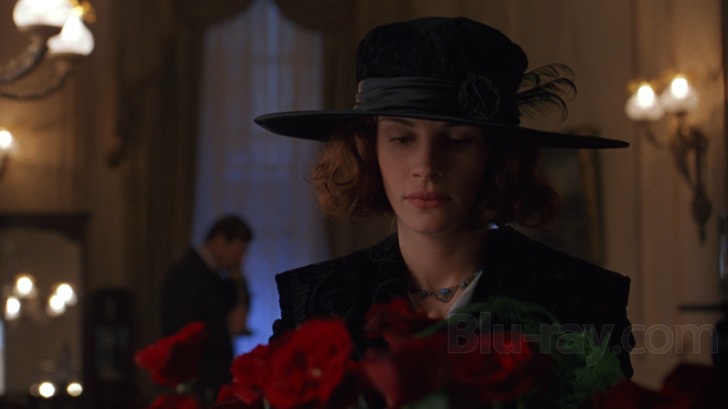
Warner first released Michael Collins on DVD in 1997 on one of its infamous "flipper" discs that
split the film between two sides. The only extras were a trailer and the episode of The South Bank
Show described below. WAC subsequently remastered the film for continuous play on a dual-layer DVD. For the film's Blu-ray debut, WAC
has ported over the DVD extras, added new ones
and remastered the film's trailer in 1080p:
- Commentary with Writer/Director Neil Jordan: Recorded in 2015, Jordan's commentary is a fascinating mixture of history lesson, technical detail about the production, response to criticisms of the dramatic license he took for key events, and comments on the state of Ireland today. There are a few gaps, with the largest occurring at around 35:00, but otherwise Jordan speaks continuously.
- In Conversation with Neil Jordan (1080p; 1.78:1; 4:43): This new interview serves as an introduction to the film, with Jordan summarizing the history of the project and commenting briefly on events since the film was released.
- South Bank Show (480i; 1.33:1; 51:11): Hosted by Melvyn Bragg, this installment of The South Bank Show was produced for the original release of Michael Collins. It combines a behind-the-scenes account of the production with a detailed review of the historical events and personalities. Jordan, Neeson and producer Stephen Wooley are among the interviewees, along with Collins' biographer Tim Pat Coogan and numerous historians. The segment includes photographs and vintage film of the real Collins, de Valera and other key figures.
- Theatrical Trailer (1080p; 1.85:1;1:44).
- Deleted Scenes (1080p; 1.78:1; 6:00): The scenes are not separately listed or selectable. The most interesting involves a deleted subplot about an attempt by the British authorities to set a trap for Collins using an arms dealer.
Michael Collins Blu-ray Movie, Overall Score and Recommendation 

Jordan first achieved international fame with The Crying Game,
whose protagonist was an IRA
foot soldier drawn into an unlikely confluence of private lives and factional machinations.
Although the earlier film is more an intimate drama than a historical epic on the scale of Michael
Collins, both share Jordan's distinctive ability to infuse headline events with a personal,
emotional core. As Jordan repeatedly notes in the extras, Michael Collins drew urgency from the
stubborn continuance of the conflicts depicted in the film, which remained raw and unresolved at
the time. Production began during a ceasefire declared by the IRA in 1994, while post-production
was marked by the resumption of hostilities with the deadly Canary Wharf bombing on February
9, 1996. Not until Good Friday, April 10, 1998, did the parties sign agreements that ended both
"the Troubles" and British control of Ireland. That outcome was by no means certain while
Jordan was making the film, and twenty years after Michael Collins's release, it still conveys the
peculiar mix of hope and fury, of determination and sorrow, that fueled its titular hero's crusade.
Highly recommended.
Similar titles
Similar titles you might also like

Born on the Fourth of July 4K
Shout Select | Collector's Edition
1989

Salvador 4K
1986

Heaven & Earth
Limited Edition to 3000 - SOLD OUT
1993

Cromwell
1970

Hotel Rwanda
2004

Restrepo
2010

Anthropoid
2016

The Killing Fields
1984

Resistance
2020

Alexander the Great
1956

The Imitation Game
2014

Roots
2016

Downfall
Der Untergang | Collector's Edition
2004

The Diary of Anne Frank
50th Anniversary Edition
1959

Joan of Arc
1948

The Conspirator
2010

Che: Part One
2008

Patton
1970

Che: Part Two
2008

Max Manus: Man of War
2008
